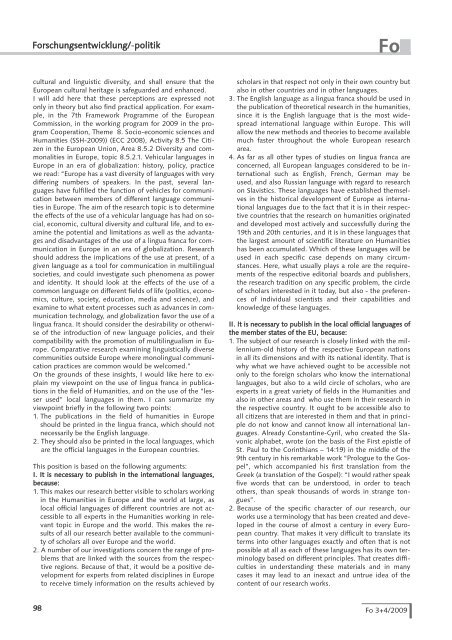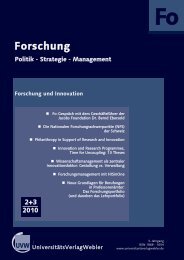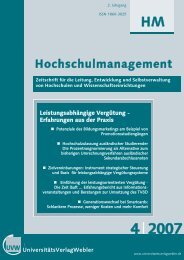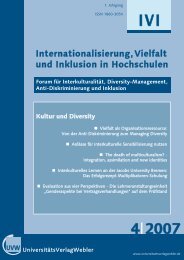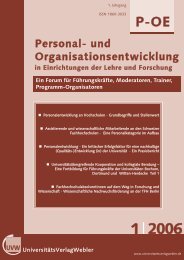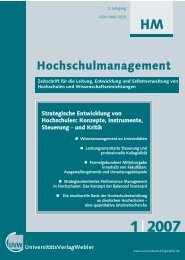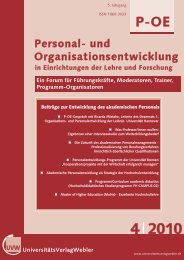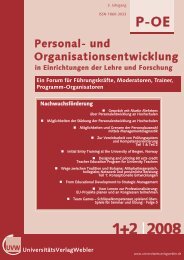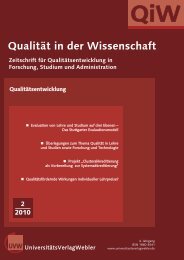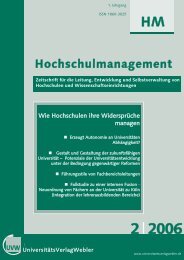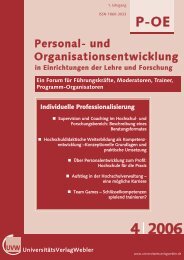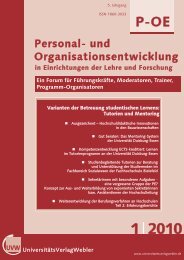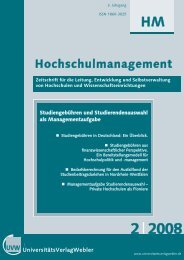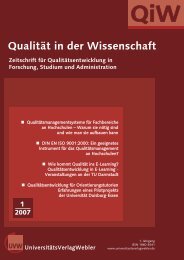Fo - UniversitätsVerlagWebler
Fo - UniversitätsVerlagWebler
Fo - UniversitätsVerlagWebler
Erfolgreiche ePaper selbst erstellen
Machen Sie aus Ihren PDF Publikationen ein blätterbares Flipbook mit unserer einzigartigen Google optimierten e-Paper Software.
<strong>Fo</strong>rschungsentwicklung/-politik<br />
<strong>Fo</strong><br />
cultural and linguistic diversity, and shall ensure that the<br />
European cultural heritage is safeguarded and enhanced.<br />
I will add here that these perceptions are expressed not<br />
only in theory but also find practical application. <strong>Fo</strong>r example,<br />
in the 7th Framework Programme of the European<br />
Commission, in the working program for 2009 in the program<br />
Cooperation, Theme 8. Socio-economic sciences and<br />
Humanities (SSH-2009)) (ECC 2008), Activity 8.5 The Citizen<br />
in the European Union, Area 8.5.2 Diversity and commonalities<br />
in Europe, topic 8.5.2.1. Vehicular languages in<br />
Europe in an era of globalization: history, policy, practice<br />
we read: “Europe has a vast diversity of languages with very<br />
differing numbers of speakers. In the past, several languages<br />
have fulfilled the function of vehicles for communication<br />
between members of different language communities<br />
in Europe. The aim of the research topic is to determine<br />
the effects of the use of a vehicular language has had on social,<br />
economic, cultural diversity and cultural life, and to examine<br />
the potential and limitations as well as the advantages<br />
and disadvantages of the use of a lingua franca for communication<br />
in Europe in an era of globalization. Research<br />
should address the implications of the use at present, of a<br />
given language as a tool for communication in multilingual<br />
societies, and could investigate such phenomena as power<br />
and identity. It should look at the effects of the use of a<br />
common language on different fields of life (politics, economics,<br />
culture, society, education, media and science), and<br />
examine to what extent processes such as advances in communication<br />
technology, and globalization favor the use of a<br />
lingua franca. It should consider the desirability or otherwise<br />
of the introduction of new language policies, and their<br />
compatibility with the promotion of multilingualism in Europe.<br />
Comparative research examining linguistically diverse<br />
communities outside Europe where monolingual communication<br />
practices are common would be welcomed.”<br />
On the grounds of these insights, I would like here to explain<br />
my viewpoint on the use of lingua franca in publications<br />
in the field of Humanities, and on the use of the "lesser<br />
used" local languages in them. I can summarize my<br />
viewpoint briefly in the following two points:<br />
1. The publications in the field of humanities in Europe<br />
should be printed in the lingua franca, which should not<br />
necessarily be the English language.<br />
2. They should also be printed in the local languages, which<br />
are the official languages in the European countries.<br />
This position is based on the following arguments:<br />
I. It is necessary to publish in the international languages,<br />
because:<br />
1. This makes our research better visible to scholars working<br />
in the Humanities in Europe and the world at large, as<br />
local official languages of different countries are not accessible<br />
to all experts in the Humanities working in relevant<br />
topic in Europe and the world. This makes the results<br />
of all our research better available to the community<br />
of scholars all over Europe and the world.<br />
2. A number of our investigations concern the range of problems<br />
that are linked with the sources from the respective<br />
regions. Because of that, it would be a positive development<br />
for experts from related disciplines in Europe<br />
to receive timely information on the results achieved by<br />
scholars in that respect not only in their own country but<br />
also in other countries and in other languages.<br />
3. The English language as a lingua franca should be used in<br />
the publication of theoretical research in the humanities,<br />
since it is the English language that is the most widespread<br />
international language within Europe. This will<br />
allow the new methods and theories to become available<br />
much faster throughout the whole European research<br />
area.<br />
4. As far as all other types of studies on lingua franca are<br />
concerned, all European languages considered to be international<br />
such as English, French, German may be<br />
used, and also Russian language with regard to research<br />
on Slavistics. These languages have established themselves<br />
in the historical development of Europe as international<br />
languages due to the fact that it is in their respective<br />
countries that the research on humanities originated<br />
and developed most actively and successfully during the<br />
19th and 20th centuries, and it is in these languages that<br />
the largest amount of scientific literature on Humanities<br />
has been accumulated. Which of these languages will be<br />
used in each specific case depends on many circumstances.<br />
Here, what usually plays a role are the requirements<br />
of the respective editorial boards and publishers,<br />
the research tradition on any specific problem, the circle<br />
of scholars interested in it today, but also - the preferences<br />
of individual scientists and their capabilities and<br />
knowledge of these languages.<br />
II. It is necessary to publish in the local official languages of<br />
the member states of the EU, because:<br />
1. The subject of our research is closely linked with the millennium-old<br />
history of the respective European nations<br />
in all its dimensions and with its national identity. That is<br />
why what we have achieved ought to be accessible not<br />
only to the foreign scholars who know the international<br />
languages, but also to a wild circle of scholars, who are<br />
experts in a great variety of fields in the Humanities and<br />
also in other areas and who use them in their research in<br />
the respective country. It ought to be accessible also to<br />
all citizens that are interested in them and that in principle<br />
do not know and cannot know all international languages.<br />
Already Constantine-Cyril, who created the Slavonic<br />
alphabet, wrote (on the basis of the First epistle of<br />
St. Paul to the Corinthians – 14:19) in the middle of the<br />
9th century in his remarkable work “Prologue to the Gospel”,<br />
which accompanied his first translation from the<br />
Greek (a translation of the Gospel): “I would rather speak<br />
five words that can be understood, in order to teach<br />
others, than speak thousands of words in strange tongues”.<br />
2. Because of the specific character of our research, our<br />
works use a terminology that has been created and developed<br />
in the course of almost a century in every European<br />
country. That makes it very difficult to translate its<br />
terms into other languages exactly and often that is not<br />
possible at all as each of these languages has its own terminology<br />
based on different principles. That creates difficulties<br />
in understanding these materials and in many<br />
cases it may lead to an inexact and untrue idea of the<br />
content of our research works.<br />
98<br />
<strong>Fo</strong> 3+4/2009


